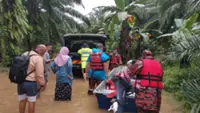FROM selling jungle products at roadside stalls and five-foot ways, a group of B40 women has adapted to using digital technology to alleviate poverty.
When the opportunity to learn about e-commerce and handicraft-making arose, some 30 of these enterprising ladies from Kampung Sijiram in Kota Samarahan did not think twice to sign up.





